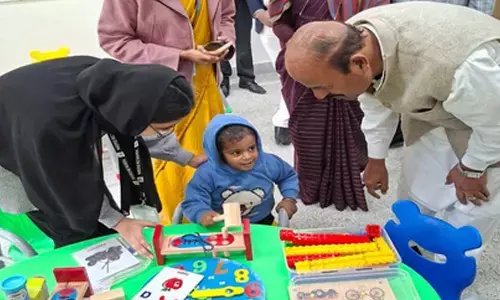School Education Saga-VIII: Does TSCERT do research in developing curriculum?

A source for the ‘Happiness Curriculum’ relies on Aristotle’s beliefs that trees and children do not have an innate capacity to feel happiness, which contradicts contemporary scientific views
Hyderabad: Does the Telangana State Council of Education, Research and Training (TSCERT) do any research on its own to come up with curriculum development? Is it importing curriculum without making any original contributions to justify its functioning?
These questions assume significance given the real issues faced by both the teachers and students.
Take for example, early on, the state government had decided to introduce a ‘Happiness Curriculum’ in the school syllabus. Speaking to The Hans India, sources in the State School Education Department (SSED) say that the decision to introduce the ‘Happiness Curriculum’ has been taken from what was introduced as a curriculum in the government schools run by the Delhi government. The curriculum was designed and developed by the State Council of Education Research and Training of Delhi. “The decision was taken at the highest level and the state education department has to fall in line with it. The TSCERT has no role in its introducing,” said a senior official.
The ‘Happiness Curriculum’ is tipped as the game changer to create awareness among the school children, creating mindfulness and how to understand and not go awry in their day-to-day actions and dealings.
The syllabus and background reasoning of the document for introducing the ‘Happiness Curriculum’ appear noble. However, a cursory look at the basic template from where the roots of this entire reasoning come entirely from foreign sources. The research on experiential learning, the importance of happiness, case studies, recommendations, and country happiness rankings all come from foreign sources. When asked whether the TSCERT experts evaluated the Delhi SCERT reasoning and backdrop, the answer was negative.
Political and official interference, pressure and decisions mounted on the TSCERT seem to make it not act as an independent academic body.
One of the source books for the Happiness Curriculum taken from the DSCERT relies on a book ‘Stonehouse, P., Allison, P., & Carr, D. (2011). Aristotle, Plato, and Socrates: Ancient Greek perspectives on experiential learning, Sourcebook of experiential education: Key thinkers and their contributions, 18-25.’
Thus, it highlights the contribution of ancient Greek philosopher Aristotle (384 BC-322 BC), and his idea of happiness laid out in his book ‘Nicomachean Ethics’. However, the suggestions made by him in his book for pursuing happiness were not agreed by many, as they are not relevant in contemporary times. For example, Aristotle believed that trees and children do not have an innate capacity to feel happiness. The reason being the dominant view of the Greek society of his days that slaves, women and children were not really considered human.
That apart, contrary to what Aristotle holds, the famous Indian scientist Jagadish Chandra Bose had demonstrated that plants could experience sensations and feel pleasure and pain. What made the DSCERT still rely on Aristotle and ignore the contemporary proven scientific results? How either Telangana School Education Department (TSED) or TSCERT just imports and adopts things without scrutinising the basic ideals and concepts flowing into the development of the curriculum remains a million-dollar question.








